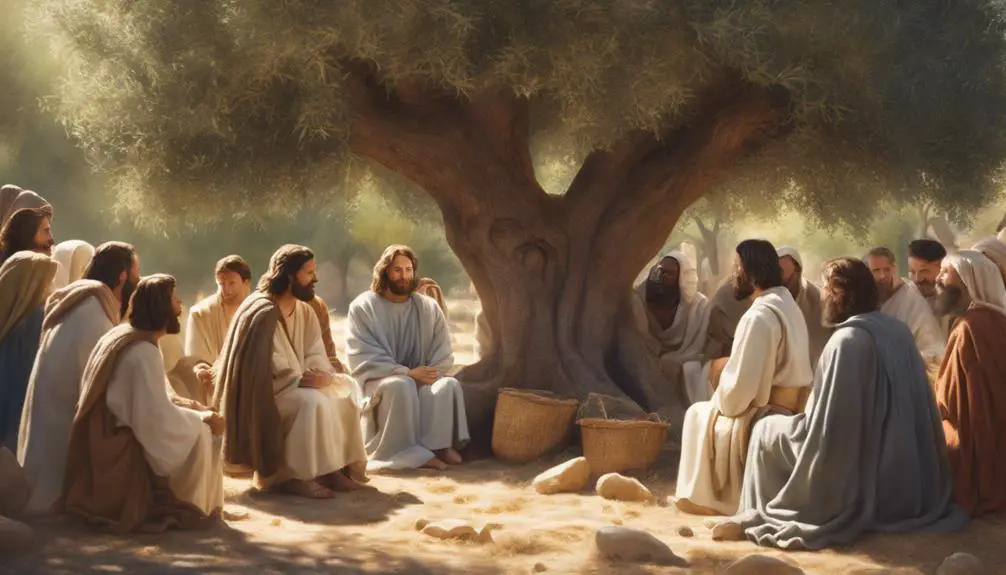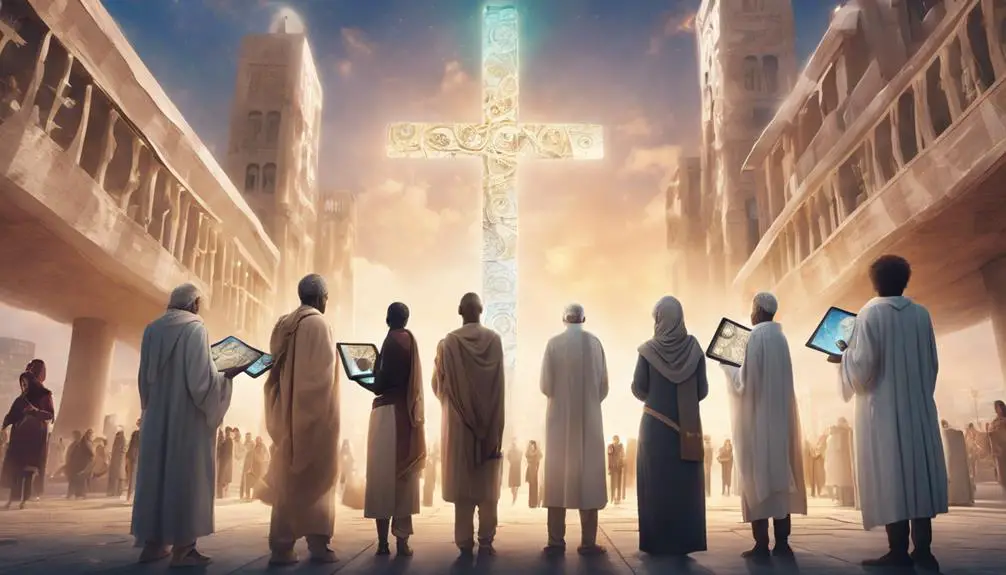Learn about the profound role of a witness in the Bible, where seeing meets divine responsibility and beckons your deeper engagement with faith.

What Is a Witness in the Bible
In the tapestry of biblical narratives, witnesses are the threads that bring depth and color to the unfolding story.
You'll find that a witness in the Bible isn't just someone who saw something; it's a role steeped in responsibility, courage, and divine calling.
From the Old Testament's prophets who bore witness to God's promises, to the New Testament believers who testified to the life and resurrection of Jesus, each had a unique role in God's plan.
As you explore further, you'll uncover how this ancient concept of witnessing isn't just historical—it's a living invitation that extends to you today, challenging your understanding of faith and your role within it.
Key Takeaways
- A witness in the Bible sees, experiences, and testifies to God's works and truth.
- Biblical witnessing involves integrity, transformation, and revelation within the community.
- Witnesses range from Old Testament figures like Moses to New Testament apostles, emphasizing faithfulness and global evangelism.
- Modern witnessing extends to digital evangelism and legal testimony, emphasizing integrity and alignment with biblical truths.
Biblical Definition of Witness

In the biblical context, 'witness' encompasses both the act of seeing and testifying to the truth of God's works and word, reflecting a critical role in the fabric of faith and community. You're drawn into a realm where witness integrity isn't just an ideal but a foundational element that underpins the credibility and transformative power of the testimony shared. This integrity is crucial, as the veracity of a witness's account can affirm faith, instruct, correct, and encourage both the individual and the collective body of believers.
As you delve deeper, you'll notice the testimony evolution within the biblical narrative. Initially, witnessing might seem as straightforward as recounting an event or a divine intervention. However, it's evident that the concept matures and expands, integrating not just what one has seen but also the lived experiences of God's presence, promises, and fulfillment. This evolution signifies a shift from mere observation to a profound personal encounter with the divine, which in turn, enriches the communal understanding and experience of God's reality.
The biblical definition of a witness, therefore, isn't static. It's a dynamic interplay between seeing, experiencing, and testifying. This multifaceted role serves not only as a historical record of divine activity but also as a means of revelation and edification for the community. It's about bearing truth in a manner that's both authentic and transformative, ensuring that the testimony given isn't just heard but deeply felt and lived out within the community of faith. This is the essence of witness integrity and the heart of testimony evolution in the biblical sense.
Old Testament Witnesses

Exploring Old Testament witnesses, you'll find that their testimonies serve as foundational bedrocks, shaping the early fabric of faith through firsthand accounts of divine interaction. These witnesses, often prophets or leaders chosen by God, played pivotal roles in guiding the Israelites, delivering prophetic declarations, and participating in covenant rituals that defined the relationship between God and His people. Their experiences and the lessons they imparted form a crucial part of the scriptural narrative, offering insights into God's character and His expectations for His followers.
Witness |
Role in Covenant |
Key Contribution |
|---|---|---|
Moses |
Lawgiver |
Delivered the Ten Commandments |
Abraham |
Patriarch |
Father of Nations, Covenant |
Isaiah |
Prophet |
Prophetic declarations of hope |
Through their stories, you're invited to reflect on the weight of being a witness to God's power and mercy. Moses, for instance, not only received the law from God but also witnessed His divine justice and forgiveness. Abraham's journey underscores the significance of faith and obedience in upholding one's part in God's covenant. Meanwhile, Isaiah's prophecies reveal a deep understanding of God's plan for redemption, emphasizing the transformative power of witnessing God's word.
These Old Testament witnesses, through their actions and words, underscore the importance of faithfulness, the seriousness of God's commands, and the hope that lies in God's promises. Their lives offer a blueprint for understanding how divine-human interactions have steered the course of biblical history and how, even today, their stories serve as a testament to God's enduring faithfulness and love.
Witnesses in the New Testament

How do the witnesses in the New Testament build upon the foundation laid by their Old Testament predecessors, and what unique roles do they play in the unfolding narrative of faith? You'll find that while the Old Testament witnesses laid the groundwork through prophecy and faithfulness, New Testament witnesses, particularly through apostolic testimonies, bring these prophecies to fulfillment and expand the covenant community to include Gentiles, thereby broadening the scope of God's redemptive plan.
- Apostolic Testimonies: The apostles play a pivotal role as primary witnesses in the New Testament. They don't just recount the works and words of Jesus; they embody the living testimony of His resurrection, the cornerstone of Christian faith. Their firsthand experiences and teachings form the foundation of the early church and are crucial for the dissemination of the Gospel.
- Gentile Inclusion: A remarkable shift seen in the New Testament is the intentional inclusion of Gentiles into the faith community. This move, foretold by Old Testament prophets, is actualized through the apostles' ministry, particularly Paul's. His missions underscore the universality of the Gospel, breaking down the barriers that had previously defined God's chosen people.
- Expansion of Witnessing Roles: The New Testament broadens the concept of witnessing beyond the confines of Israel to a global mandate. Every believer, regardless of their background, is called to be a witness, reflecting a dramatic expansion of witnessing roles. This inclusivity and global perspective underscore the transformative power of the Gospel message, bridging diverse peoples into a single faith community.
In reflecting on these points, it's clear how New Testament witnesses significantly advance the narrative of faith, emphasizing apostolic testimonies and Gentile inclusion as key elements of God's unfolding redemption story.
The Role of Jesus as Witness

At the heart of the New Testament narrative, Jesus stands as the ultimate witness, embodying God's redemptive work through His life, death, and resurrection. Through His actions and teachings, He not only fulfilled Messianic prophecies but also revealed His divinity, providing a living testament to God's love and plan for humanity.
Aspect of Jesus' Witness |
Description |
|---|---|
Fulfillment of Prophecy |
Jesus' life aligns with numerous Messianic prophecies, affirming His role as the Messiah and authenticating His witness. |
Revelation of Divinity |
Through miracles and teachings, Jesus reveals His divine nature, offering a glimpse into God's character and intentions. |
Model of Sacrificial Love |
His death and resurrection epitomize the ultimate sacrifice, showcasing God's redemptive love and justice. |
Jesus' role as a witness goes beyond mere testimony; it's an active demonstration of God's kingdom at work. He doesn't just speak of God's love; He embodies it, making the abstract concrete and the divine relatable. Through His alignment with Messianic prophecy, He validates the truth of the scriptures, offering assurance of His authenticity and purpose. Moreover, Jesus' divinity, manifested through His actions and miraculous signs, underscores the credibility of His witness. He's not just a messenger but the message itself—God incarnate, inviting us to understand the depth of God's love and the seriousness of His call to redemption.
In reflecting on Jesus' role as a witness, you're invited to consider the depth of His testimony—not only in words but in the very fabric of His being and actions. This reflection not only deepens your understanding of Jesus' divinity and fulfillment of prophecy but also challenges you to live in response to His ultimate witness of love and redemption.
Witnessing Through Persecution

Reflecting on Jesus' embodiment of God's redemptive love, it's crucial to consider how believers are called to witness through persecution, echoing His testament of faith under trial. This path isn't devoid of suffering; rather, it's marked by a profound resilience and unwavering commitment to uphold the truth, even in the face of dire consequences. Persecution resilience becomes a testament to the strength and authenticity of one's faith, serving as a beacon of hope and steadfastness in tumultuous times.
Here are three key aspects of witnessing through persecution:
- Embracing Suffering with Grace: The narrative of Christian martyrdom is replete with stories of individuals who faced persecution with a serene and unshakeable faith. These martyrdom stories aren't just historical accounts but are powerful testimonies to the transformative power of embracing suffering for one's beliefs.
- Fostering Community and Solidarity: Persecution often serves as a crucible for strengthening communal bonds among believers. It's in these moments of trial that the true essence of the Christian community comes to the forefront—offering support, prayers, and encouragement to those facing trials for their faith.
- Living Testimonies of Faith: The act of witnessing through persecution isn't merely a passive endurance of suffering but an active and living testimony of one's faith. It's about demonstrating how, even in the darkest of times, one's faith remains unbroken, reflecting a deep trust in God's sovereignty and goodness.
In essence, witnessing through persecution is a profound embodiment of faith, where believers not only affirm their trust in God's promises but also exemplify the enduring power of grace under pressure.
Modern Implications of Witnessing

In today's rapidly evolving world, the concept of witnessing has taken on new dimensions, challenging believers to navigate their faith amidst diverse societal changes and technological advancements. The intertwining of legal testimony and digital evangelism as modern forms of witnessing underscores a broader, more complex landscape for propagating one's faith.
You're tasked with discerning the integrity and truthfulness inherent in legal testimony, reflecting the biblical mandate for honest and unblemished witness. This aspect of witnessing, while deeply rooted in scriptural principles, now intersects significantly with secular legal systems. It demands a reflection on how you, as a believer, embody your faith in environments governed by legal and ethical standards that may not always align with biblical teachings.
Simultaneously, digital evangelism opens a novel frontier for witnessing, one that transcends traditional geographical and social boundaries. You're afforded unprecedented platforms to share your faith, but this also requires a critical evaluation of how digital spaces can both enhance and challenge the authenticity of your witness. The digital realm, with its potential for anonymity and the rapid dissemination of information, poses questions about the depth and impact of digital testimonies. You're called to navigate these spaces with discernment, ensuring that your digital footprint aligns with the values and truths of your faith.
Thus, modern implications of witnessing compel you to engage with both the legal and digital spheres thoughtfully and strategically. They prompt a reflective consideration of how you embody your witness in every aspect of life, ensuring that your testimony, whether in court or online, resonates with the integrity and fervor of biblical witnesses.
Frequently Asked Questions
How Does the Concept of a Witness in the Bible Relate to Legal Systems in Contemporary Society?
You're exploring how the biblical role of a witness transitions into modern legal practices. Legal testimonies today are foundational, similar to biblical times where witnessing was crucial for establishing truth.
The concept of witness protection, although a contemporary development, echoes the biblical emphasis on the safety and integrity of witnesses.
This analysis reveals a deep-rooted connection between ancient principles and their evolution into the safeguards within today's judicial systems, highlighting a continuous thread of valuing truth and justice.
Are There Any Significant Differences in the Role or Perception of Witnesses Between Different Denominations or Branches of Christianity?
Yes, you'll find significant differences in how witnesses are perceived and trained across Christian denominations. Some branches emphasize witness training more rigorously, preparing members to share their denominational testimonies effectively.
Others might focus less on formal training, relying more on personal faith expressions. These variations reflect broader theological and practical approaches within Christianity, showing how each denomination uniquely values and practices the role of witnessing.
How Has the Historical Context of the Bible Influenced the Portrayal and Duties of Witnesses Within Its Texts?
The historical context of ancient testimonies deeply influences how witnesses are portrayed in biblical texts.
You'll find that cultural interpretation plays a crucial role in shaping their duties and perceptions.
As you delve into these ancient narratives, you'll notice that the societal norms and legal practices of the time are intricately woven into the fabric of these stories, reflecting a complex interplay between divine commandments and human actions.
Can the Concept of a Witness in the Bible Be Connected to Practices in Other Religions or Cultural Traditions Outside of Christianity?
Absolutely, you can find connections between the concept of a witness in the Bible and practices in other religions or cultural traditions.
Witness symbolism deeply intertwines with cultural narratives, offering a rich tapestry of shared humanity's values and ethical frameworks.
Reflecting on these parallels, you'll uncover how witnessing transcends individual religious doctrines, embodying a universal principle of truth-telling and moral integrity that resonates across diverse spiritual landscapes.
What Are the Psychological Implications for Individuals Who Perceive Themselves as Witnesses in a Religious or Spiritual Sense, According to Modern Psychology?
When you see yourself as a witness in a spiritual sense, it profoundly affects your identity formation and sense of moral responsibility. Modern psychology suggests this self-perception can lead to a stronger sense of purpose and ethical orientation.
However, it also places immense pressure on you to live up to the ideals and expectations associated with this role, potentially causing anxiety or a feeling of being constantly evaluated.
Conclusion
In your journey through the biblical terrain, you've encountered the multifaceted role of witnesses, from the annals of the Old Testament to the living testimony of Jesus in the New Testament. Witnessing, whether through words or through the crucible of persecution, remains a cornerstone of faith.
In today's digital Colosseum, the act of witnessing adapts, yet its essence persists. Reflecting on this, you grasp that witnessing isn't just historical; it's a dynamic, ongoing dialogue between past convictions and present realities.



Sign up